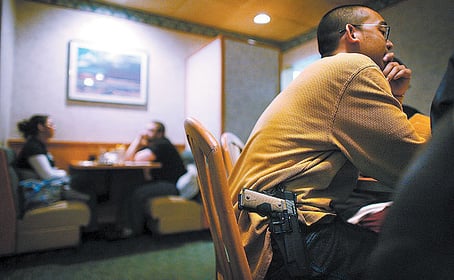Be of sound mind.
More important than having the perfect holster or training on the Sig Sauer Academy range — the concealed carrier needs to have his wits about him at all times.
What is a sound mind?
- Control of your emotions
- Calm reasoning
- Observant of your surroundings
- Steady nerves
- No desire to harm yourself or others
If any of those five things fall apart, the concealed carrier has become the liability.
Practices To Maintain A Sound Concealed Carry Mind
This isn’t the part of the article where I try to pawn off some new-age enlightenment spiel. What I will say is that the practice of simply sitting and quieting the mind can be extremely soothing to the nerves. As a former combat veteran, being able to separate myself from the clutter of thoughts swarming around in my head has enabled a degree of clarity. When an emotion rises, like anger or sadness, I am able to observe it without letting it occupy my mind.
This is important.
When I walk down the streets of my city, instead of seeing situations in which to insert myself into another’s drama, I’m able to calmly be aware of it and move past it. The heroin epidemic in my state of New Hampshire has created a whole host of additional dangers. But when I walk down a dimly lit street at night, I’m not concerning myself with others’ affairs. I’m staying focused and present in my surroundings. When a car stops and a woman gets out yelling at the driver, I’m not there to pour gasoline on that struggle. I’m there to move past it and beyond it.
A daily commitment to simply sitting.
In Zen Buddhism, it can be called zazen. It is the practice of living moment-to-moment, discovered through sitting on a cushion and separating yourself from any and all external distractions.
No matter your faith or particular belief, the ability to divorce yourself from your own mental clutter is valuable to situational awareness and threat detection. You’re not looking at someone as a “threat waiting to present himself”. You’re observing the person. In that moment, the person tells you all you need to know and there is no anxiety.
Another fantastic practice is daily exercise.
Every day I walk and do isometric exercises to maintain core muscle strength. The core muscles are precisely the ones you’ll rely on first and foremost in an actual struggle. They are fast, resilient, and extremely strong. Colion Noir did a fun little video examining the role of exercise in marksmanship and reaction times.
A physically healthy mind and body will go a long way to surviving not just the conflict itself, but the aftermath.
One of the least talked about elements in actual combat is the aftermath. It’s euphemistically studied under such terms as Post Traumatic Stress Disorder and a number of other health insurance-friendly terms. But the actual aftermath is something that afflicts millions of United States military veterans, police officers, and those who are regularly placed into traumatic situations.
In an article authored by Hwan Kim LSang of the University of New Mexico, he discusses the realities of setting achievable goals, using repetition, and being supportive to ensure that those whom have dealt with traumatic situations are given the best effects of regular exercise. This lesson also applies to individuals without PTSD.
And lastly – learn to breathe. Breathe.
We take our breath for granted. By proxy of us being alive right now, we’re obviously breathing. However, breathing plays a fundamental role in our physiology and mental state. In ancient cultures, people practiced different breathing exercises to achieve altered states of mind. Whether it was a warrior preparing himself to go into battle or a mother preparing to give birth to a child — the cycle of air through our lungs dictates a lot about how we observe our environment.
The old adage, “if you’re a hammer – every problem looks like a nail.”
Similarly, if you find yourself constantly staring at threats, take a few deep breaths and exhale slowly.
Make no mistake – regular exercise, meditation, and breathing are all key components to having a sound mind. A sound mind is what you will depend upon to carry you through a conflict.




![[VIDEO] Realizing That A Threat Is Approaching Before It’s Too Late](https://imagedelivery.net/sbm_lYeJbALkepJgtmRD5w/concealednation.org/2019/08/ScreenHunter_2547-Aug.-15-12.12.jpg/w=728,h=381)

![3 Concealed Carry Habits to Stay Out of Jail [VIDEO]](https://imagedelivery.net/sbm_lYeJbALkepJgtmRD5w/concealednation.org/2019/04/30717816_m_stock-photos.jpg/w=728,h=381)



![[VIDEO] Woman Rams Multiple Cars Including Police Before Rolling Over, Bystander Yells “SHOOT THAT WOMAN”](https://imagedelivery.net/sbm_lYeJbALkepJgtmRD5w/concealednation.org/2015/10/ScreenHunter_144-Oct.-12-12.16.jpg/w=728,h=381)


![[BREAKING] West Virginia Governor Tomblin Vetos Constitutional Carry](https://imagedelivery.net/sbm_lYeJbALkepJgtmRD5w/concealednation.org/2015/03/ScreenHunter_356-Mar.-20-22.25.jpg/w=728,h=381)
